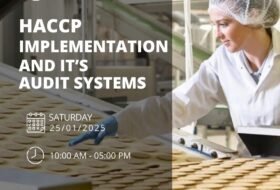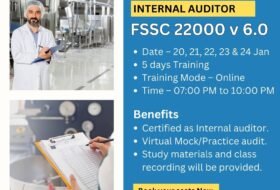EP Infoways Institute of Food Safety and Hygiene is leading organization to provide various Food Safety Trainings and Certifications. It is also registered Training Partner with FOSTAC – FSSAI for Training and Certification for FOSTAC Courses. .
These Courses of Food Hygiene and Safety will help you to recognize your food hygiene responsibilities so that you can act conscientiously and demonstrate to customers that you and your business take food safety seriously. By taking this training, you will develop a strong foundational knowledge of food hygiene practices and food safety law, and show that you strive to follow best practice and are proud to do so – something that will give your customers great confidence in your business.
This course is fully up to date with the latest Indian and International laws, rules and regulations to ensure you feel confident to apply the food safety practices mentioned to your own job role.
As per the law, every food business must ensure that they have effective food safety management system in place by following all the 7 principles of HACCP. It is the responsibility of the workplace managers or supervisors to involve themselves during the planning stage of the HACCP system itself and make sure that workers work safely and comply with food safety standards and principles.
What is HACCP certification?
This Level 3 HACCP training for Catering & Retail course is intended to make learners comprehend important aspects of a successful HACCP food safety management structure. The course trains candidates enhance their skills to follow HACCP panning process and helps them to identify food safety hazards, to use appropriate control measures and ensure that HACCP system works effectively.
This course is divided into fifteen accessible, interactive modules and includes an assessment at the end.
- An Introduction to HACCP – what is food safety management, key terms, what is HACCP, benefits of HACCP and why HACCP is important.
- HACCP and The Law – food safety legislation, training requirements, enforcing the law and due diligence.
- HACCP Alternatives – should I use HACCP? Safer Food Better Business, CookSafe, Safe Catering, ISO 9001:2015, ISO 22000:2005, other national guides and certification schemes.
- Planning a HACCP System – preparing for HACCP, creating a HACCP plan and HACCP success vs failure.
- Microbial Hazards – Microbial contamination and prevention, Pathogenic bacteria, Toxins & bacterial spores, Food-borne diseases, Food spoilage, Viral contamination, The top 10 causes of food poisoning, Low and high-risk foods, Food preservation, Bacteria growth – atmosphere
- Food Safety Hazards – how contamination applies to HACCP, types of contamination, physical, chemical, microbial and allergenic contamination, top 10 causes of food poisoning and controlling the hazards.
- Prerequisite Programmes – what are prerequisites? Examples of prerequisites, effective prerequisites and assessing prerequisites.
- Creating the HACCP System – the 7 principles, creating the HACCP team, HACCP team responsibilities, HACCP team skills, describing the products and ingredients, identifying the products’ uses and consumers, constructing a flow diagram and confirming the flow diagram in the premises.
- Principle 1: Hazard Analysis – what is hazard analysis? The 3-stage approach, hazard analysis documentation, prerequisites/HACCP and useful contacts.
- Principle 2: Critical Control Points – what is a control measure? What is a critical control point? Overusing CCPs, decision trees and the Codex Alimentarius Commission decision tree.
- Principle 3: Critical Limits – what is a critical limit? Critical limit criteria, examples of critical limits and setting critical limits.
- Principle 4: Monitoring Critical Control Points – what is monitoring? Effective monitoring, types of monitoring, frequency of monitoring and the monitoring plan.
- Principle 5: Corrective Action – what is corrective action? Levels of corrective action, corrective action procedures, examples of corrective action and product recalls.
- Principle 6: Verification of the HACCP System – why is verification important? Validation, verification, reviewing the HACCP plan, benefits of reviewing HACCP, HACCP auditing and auditing essentials: data analysis, sampling and testing.
- Principle 7: Documentation – record keeping, maintaining the HACCP team, maintaining sources of information, maintaining HACCP documentation.
- Implementing the HACCP System – implementing HACCP, implementation methods, HACCP training, making HACCP visible and confirming completion.
Learning Outcomes
- Understand the importance and benefits of HACCP food safety management system.
- Gain the knowledge on food hygiene law and various food safety management systems.
- Successfully plan and execute the HACCP system and evade common pitfalls.
- Understand the value of implementing effective prerequisite programmers.
- Be confident in their knowledge of the 7 principles of HACCP and the 12-step process.
- Conduct effective hazard analysis and recognize critical control points.
- Know the importance of critical limits and remedial action and understand the needs of careful monitoring.
- Comprehend to validate and confirm the HACCP plans and needs of the documentation.
These courses are designed for the Internal Auditor for the company FOOD Management Systems, especially working on International Standards like ISO22000, FSSC v5, and HACCP etc. The purpose is to train potential internal auditors in the principles and practices of FSMS auditing in a manner compatible of latest guidelines as per the International Standard Available.
Trainees will be aware of current best practices in the audit process as per international standard and encouraged to develop their skills for audit purpose through discussions, analysis, and practical examples.
On completion, trainees should have gained the knowledge and skills required to prepare for and conduct internal audits.
Course Aim: To provide guidance and practical experience in planning, executing, reporting, and audit follow-up of an internal audit, when monitoring the effectiveness and conformity.
Trainees will be aware of current best practices in the audit process as per international standards and encouraged to develop their skills for audit purposes through discussions, analysis, and practical examples. On completion, trainees should have gained the knowledge and skills required to prepare for and conduct internal audits.
Who should attend:
- Business owners and leaders
- Operations Managers, Supervisors, etc.
- QA/QC managers & supervisors
- Production managers & supervisors
- HACCP team, Auditors
- All food handlers
- Anyone working in food-related organizations.
- Students or Anyone desiring to learn and improve on their knowledge of Food Safety Management Systems.
This course will help you:
- Prepare, conduct, and follow up on audit activities
- Identify and apply the benefits and requirements of an audit
- Gain the skills to assess an organization’s capability to manage
- Write factual audit reports and suggest corrective actions.
- HACCP As per Codex Alimentarius standard
- 08 & 09 April (Saturday & Sunday)
- Time – 10 am to 6 pm
- Fee – 3000/-
- Certificate validity – Lifetime
- Class also available on LMS
- 08 & 09 April (Saturday & Sunday)
🔔👥 WhatsApp – Join our groups for regular updates (Jobs, News, Training etc) If you are already in our groups, please don’t join. All Groups are same.
🔬👩🎓 Join Food safety Training Programs (Online & Offline both available)






















Comments